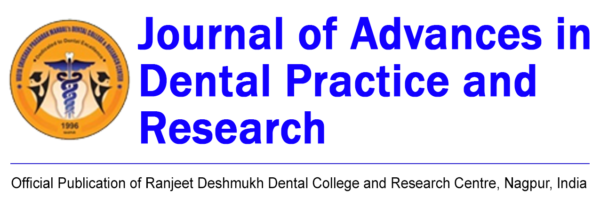Translate this page into:
Qualitative research and its implications in dentistry
*Corresponding author: Saee Deshpande, Department of Prosthodontics, VSPM Dental College and Research Center, Nagpur, Maharashtra, India. saeedeshmukh@vspmdcrc.edu.in
-
Received: ,
Accepted: ,
How to cite this article: Deshpande S. Qualitative research and its implications in dentistry. J Adv Dental Pract Res 2022;1:45.
Qualitative research has been defined as the investigation of phenomena in detail and from all aspects, through the collection of rich narrative materials using a flexible research design.
Researcher is more interested in answering “why” rather than what aspect of the phenomenon. The aim is to investigate the reality in different perspective as there can be multiple interpretations of reality and goal of research is to understand how individuals construct reality within their natural context. This is in contrast with positivism assuming that there is orderly reality that can be objectively studied. Characteristics of qualitative research are as follows:
Qualitative research studies phenomena in the natural contexts of individuals or groups
Qualitative researchers try to gain a deeper understanding of people’s experiences, perceptions, behavior, and processes and the meanings they attach to them
During the research process, researchers use “emerging design” to be flexible in adjusting to the context
Data collection and analysis are iterative processes that happen simultaneously as the research progresses.
When should I use qualitative methods?
When variables cannot be quantified
When variables are best understood in their natural settings
When variables are studied over real time
When studying intimate details of roles, processes, and groups
When the paramount objective is “understanding.”
Prerequisites for quality control in qualitative research
Properly formulated research question
Data triangulation
Good quality data
Multidisciplinary team
Adaptability.
How different is the sampling technique from quantitative research?
In qualitative research, the most commonly used deliberate sampling strategies are purposive sampling, criterion sampling, theoretical sampling, convenience sampling, and snowball sampling
Qualitative analyses typically require a smaller sample size than quantitative analyses
The goal of should be achieving data saturation. Saturation occurs when adding more participants to the study does not result in additional perspectives or information.
Qualitative content analysis is very critical for getting useful outcome from the study. The computer-assisted qualitative data analysis website provides support to make informed choices between analytical software and courses.
There is quality criteria checklist for reporting qualitative studies such as standards for reporting qualitative research and consolidated criteria for reporting qualitative research. Understanding and using qualitative research in clinical dentistry helps us to gain holistic view of any phenomenon under consideration and that leads us to find appropriate solutions. It also gives insight into how effective our treatment is as per patient’s perspective. This makes the qualitative research an indispensable tool in clinical dental research and such research should be encouraged at graduate, postgraduate, and post-doctoral level so as to enrich our literature and also improve our patient care.





